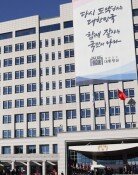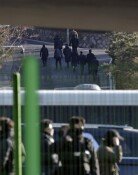Seoul blasts Tokyo for issuing entry ban
Seoul blasts Tokyo for issuing entry ban
Posted March. 07, 2020 07:53,
Updated March. 07, 2020 07:53
The Japanese government practically issued an entry ban on South Korea and China on Thursday, citing reasons such as preventing the spread of COVID-19. Measures such as cancelling issued visas and banning South Korean tourists from using public transportation are practically equal to telling them not to come. It is beyond diplomatic discourtesy, but complete disrespect for South Korea since there was no prior consultation or notice. Japan has ignored the goodwill of South Korea when South Korea has taken no travel restrictions on Japan despite 53 countries around the world restricted travel to and from Japan.
Japan’s travel restriction measure against South Korea and China was announced immediately after Xi Jinping’s state visit to Japan in April was postponed. Since there is no need for Japan to leave its door open to China with President Xi’s visit being delayed, Japan has decided to keep out tourists from China and South Korea. It appears Japan had been wanting to place travel restrictions on South Korea but delaying the decision as it was difficult to keep out South Koreans without issuing travel restrictions on China. Furthermore, Japan seems to have notified China of its decision in advance unlike the case with South Korea. There were no restrictions placed on Italy, where the death toll from the coronavirus is soaring with 41 new deaths reported on Thursday, or Iran, where the death toll has exceeded 100.
South Korea is undoubtedly better than Japan in terms of its response to COVID-19. According to the Korea Institute for Health and Social Affairs, 5.6% of people tested for the coronavirus have been confirmed positive in South Korea while the figure stood at 10.5% in Japan. The statistics backs the assumption that South Korea has a high number of confirmed cases of COVID-19 because it is testing much higher number of people (75,792) than Japan (2,517). Japan, which is reluctant to conduct coronavirus tests, appears to have targeted South Korea in order to turn a blind eye to the situation in the country. The tough policy by the Abe administration is to quell the controversy surrounding Abe’s poor response to the coronavirus outbreak and push ahead with the Tokyo Olympics.
South Korea’s National Security Council convened a meeting Friday and decided to take a countermeasure against Japan. It is only reasonable to react to Japan’s unjust actions but it will not be easy to save face in doing so. The South Korean government did not take any measures when more than 100 countries issued entry restrictions on the country. It is inconsistent for South Korea to take retaliatory measures against Japan after doing nothing to Chinese local governments’ entry ban on South Korea and insults and disadvantages South Koreans experienced in China.
The diplomatic feud between Seoul and Tokyo over entry restrictions should not grow into worsening public sentiment in both countries. The Abe administration should promptly lift its entry restrictions on South Korea and normalize exchange between the two countries. For its part, the South Korean government should keep a cool stance. It is not for the national interest to respond to Japan’s measures with reciprocal measures without having exit strategies. Nine out of South Korea’s top 10 trading partners, except for the U.S., have placed entry restrictions on the country. It is urgent for South Korea to discuss exit strategies with its allies in order to prevent uncontrollable situations from occurring.







